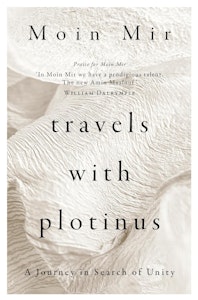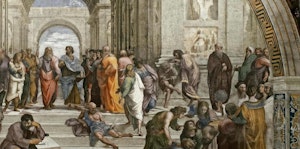This article is taken from the March 2025 issue of The Critic. To get the full magazine why not subscribe? Right now we’re offering five issues for just £10.
In AD 242, a Roman army marched eastwards, led by Emperor Gordian III, determined to defeat Rome’s nemesis, the Sassanid Empire. Gordian dreamed of replicating the achievements of Alexander the Great, his eyes set on Persia and distant India. He was not alone. Gordian III has been largely forgotten by history, his campaign ending in bloody failure, but marching behind his legions came a name that has shaped world history forever: the philosopher Plotinus.
Today, Plotinus is famous as the father of Neoplatonism, a philosophical tradition derived from the inheritance of Platonic and Aristotelian thought that has gone on to shape not just academic philosophy but also the great monotheistic religions of Christianity, Judaism and Islam.
He learnt philosophy in Alexandria, Egypt’s great cultural crossroads and one of the intellectual centres of the Mediterranean. There Platonism flourished amid the riches of Roman and Hellenic culture and fed into many other streams of thought. The city served as a major centre for Judaism and Christianity and many famous Platonists were Christians or Jews. Ammonius Saccas, Plotinus’s teacher, was from a Christian family, but his name was probably derived from the Egyptian God “Amun”.

Plotinus turned Platonism almost into a religion, but seems to have been endlessly curious about other traditions of thought and belief, which he perhaps saw as expressions of a single truth. According to his student and biographer Porphyry, that curiosity extended to Persia, and beyond it India. Offered the opportunity to travel eastwards on his terms , he leapt at the chance.
It is here that Moin Mir’s Travels with Plotinus begins. Mir sets out to travel to the places that shaped Plotinus, both the lands in which he lived and worked, but also the regions he only dreamed of reaching, going from Rome to India, and back to Egypt and Sicily.
Mir’s theme is simple: the beauty and perfection of unity. Though his book is more travel with philosophical asides than a work of academic philosophy, he is at pains to stress the parallels between Plotinus and Indian thought, making a not unconvincing case for the similarity between Plotinian and Vedic themes of spiritual ascent and theosis.
At first glance, Plotinus’s interest in India may seem strange. While Persian-influenced religions and ideas spread widely through the Roman Empire (temples of the originally Persian deity Mithras can still be seen as far afield as London), contact with India is less well known.
Those looking for deep intellectual reflection, are likely to leave disappointed
But the Indian subcontinent was more than a distant rumour to the Romans — the largest discoveries of Roman coins outside Europe and the Near East are all in India, and archeology confirms the brisk trade between the far-flung lands. Roman traders plied the Indian Ocean, and there was intermittent diplomatic contact as well.
We don’t know much about what Plotinus had heard, but it’s entirely possible he had at least some notion of the Indian tradition — perhaps enough for him to risk marching off with a Roman legion.
Historical questions aside, Mir makes a powerful case for the beauty and significance of Plotinus as a spiritual and ethical, not just conceptual, thinker. Plotinus’s description of the love of the soul for God is still desperately moving nearly 2,000 years later:
“The soul in her natural state is in love with God and wants to be united with It; it is like the noble love of a girl for her noble father … in this way the Soul also loves the One — the Good, moved by it to love from the beginning … So we must ascend again to the Good, which every soul desires.”
Mir’s earnest quest for unity, both human and metaphysical, is also moving, and his writing, at its best, has an appealing simplicity and sincerity. His account at the beginning of the book of a lone starling, calling out to summon the unity of murmuration, in which hundreds or thousands of birds become a sublime shifting unity, is rather lovely.
But those looking for deep intellectual reflection, or even an accessible treatment of Plotinus’s ideas and life, are likely to leave disappointed. Readers are perched upon Mir’s shoulder, obliged to follow him into every sidestreet, nod along at every remark, and — this is a running theme — experience every mouthful of food. If his style has its high poetic moments, it’s also unfailingly purple prose, with adjectives piled on adjectives, and events narrated ad nauseam. A typical example comes early on, as he meets with an Italian friend over dinner:
‘So, you are on a journey in the footsteps of Plotino?’ he asks as our eyes chart the menu, and after having spoken about our kids and all that’s familial.
‘Yes … beginning here in the city he lived for 26 years and where he taught,’ I reply.
‘Why?’ He asks, pointing to artichokes on the menu and signalling for two to the waiter. I had earlier given my consent for that starter.
‘Well … we live in divisive times, and I’m trying to work with his teachings. I’m trying to use Plotinian thought as a lens to understand if “unity” is really used for “good”.’
‘That’s a lot of thinking,’ he says, glancing at the waiter who brings in the artichokes doused generously in fragrant olive oil.
Meals feature heavily, along with nice views, charming and wise locals, and well-timed epiphanies. In Mir’s writing olive oil is always fragrant, cobbles gleaming, cities humming, and temples revered. At one point he chats to a Sikh cab driver in Rome, asking if he has experienced racism. The answer is no of course — that would undermine the theme.
For the most part the world he conjures into being is a rather pleasant place to visit. There are some eye-rolling moments. It’s hard not to snort into the pages when he solemnly intones that: “’The One’ will always attract intellect to bring with it the perceived many, mingling them into one — be it faith, language, or dessert.”

His argument for the spiritual beauty of Plotinus is the best and most compelling of his conclusions, but his equation of this unity with a sentimental portrait of latter-day internationalism is perhaps less persuasive. Is the takeaway from Plotinus’s universalist vision that we must never engage in “othering”? Are the acceptance speeches of Hollywood awards a reflection of ultimate divine unity? Readers can draw their own conclusions.
Like too many modern spiritual tracts, Travels with Plotinus fails to break out of the intellectual straitjacket of liberal modernity and sentimental feelgoodery. But perhaps we should not judge it too harshly for that. Moin Mir is clearly a thoughtful, humanistic thinker, and if the meal is oversweet, it’s also made with love. His enthusiasm is infectious and as I read (and enjoyed) his writing, I found myself thinking that this was a potentially excellent BBC documentary that had the misfortune to end up as a book.







